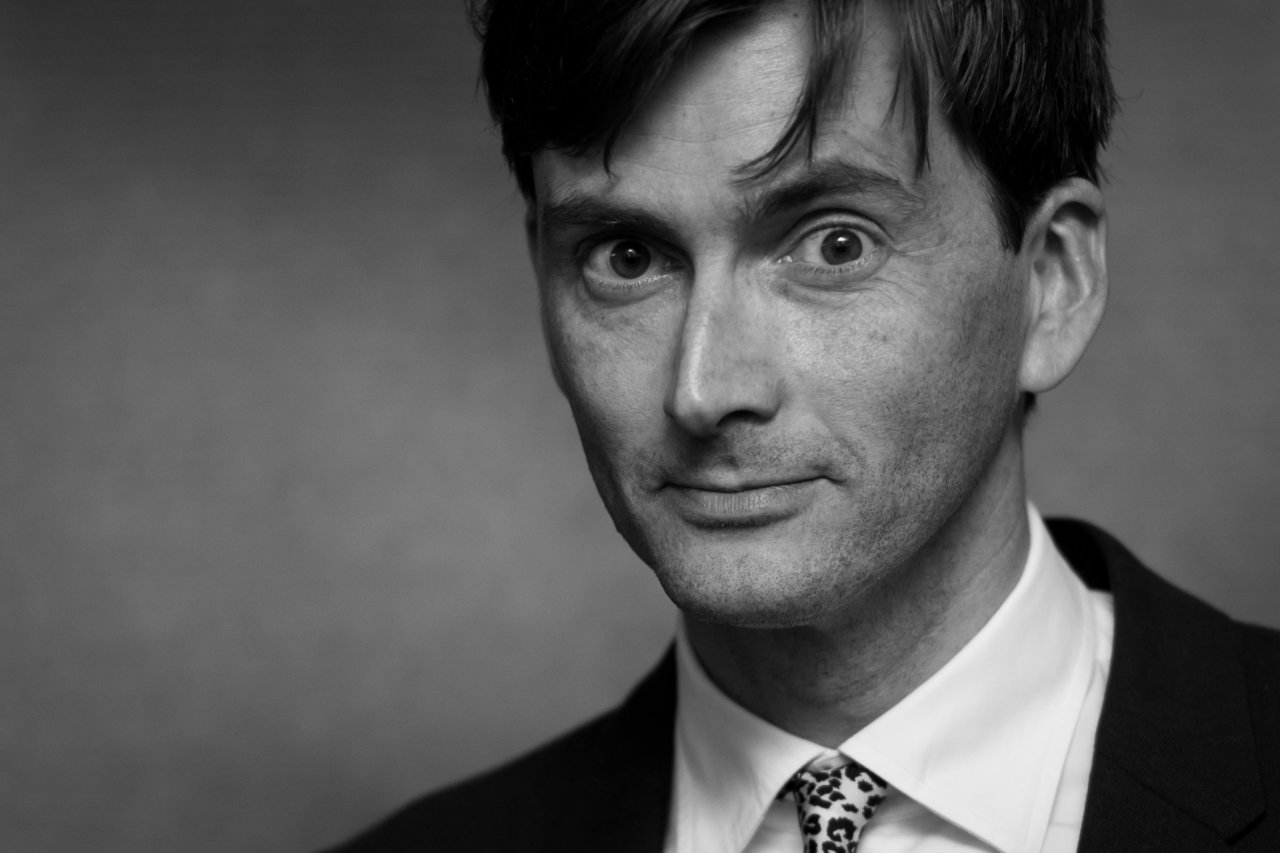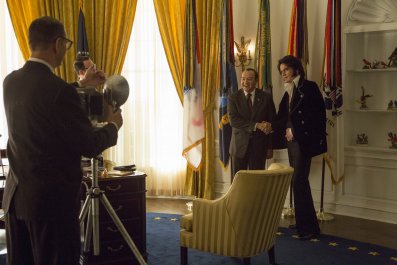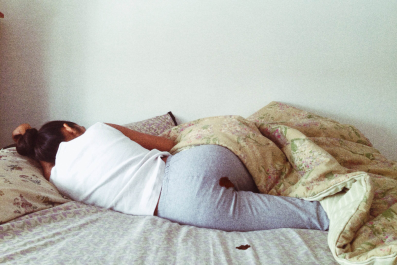Of all the kings that Shakespeare wrote about, no one could accuse Richard II of greatness. But the version of Richard onstage at Brooklyn Academy of Music's Harvey Theater—eyebrow arched high, dripping with royal disdain, even as he consistently bungles the future of his kingdom—is played with manic, disgruntled perfection by David Tennant.
Last seen as the purple-suited, mind-controlling sociopath Kilgrave in Netflix's Jessica Jones (though perhaps better known as the 10th incarnation of the Doctor on BBC's long-running Doctor Who), Tennant trades in the suit for decadent brocade robes and a flaming red halo of hair, in what is actually his second go at playing the doomed king. The play is the first of four staged by the Royal Shakespeare Company at the BAM, starting off a monthlong residency titled, King and Country: Shakespeare's Great Cycle of Kings.
Even before his turn as Doctor Who made him a beloved Tumblr mainstay, the Scottish actor was a two-decade-long veteran of the stage at the Royal Shakespeare Company, having once declared to co-star Catherine Tate that theater is his "default way of being." On the morning after his third Brooklyn performance as Richard, Tennant met with Newsweek to talk about the loopholes in Shakespearean murder plots, the obvious associations between Shakespeare and today's hubristic leaders and why he'll probably never play Superman.
I just watched your performance on Friday night.
Oh good, good. And how did you like it?
Well, here's the thing: I came fully armed. I've read the play, I read the reviews beforehand—all of which, by the way, had excellent things to say about your performance. But I don't think any of them really prepared me to expect what actually transpired on stage.
Oh really? What were you expecting?
For a king whose primary character trait is that he's so painfully weak and ineffectual as a ruler, I was surprised at how forceful your interpretation of him was. Watching you strut about the stage, there was a lot of playfulness and flamboyance. Never before have I wanted to snap my fingers along in encouragement at any of the monarchs in Shakespeare's plays before, but I did during this.
[Laughs.] He is a fairly idiosyncratic king, I suppose. See, Richard believes that he has this right to be king, and therefore however he acts and however he deports himself is correct. So he doesn't really need to conform to any perceived notion of kingship.
I've always wondered why Shakespeare gave Richard a whole play because he really doesn't serve much of a purpose other than a sort of 3-hour prologue to the events that unfold in the later Henriad plays. Richard doesn't even seem to be the hero of his own narrative—that honor belongs to Bolingbroke—so what about this play in particular convinced you to take it on?
I've always loved this play! I saw it for the first time in drama school. I saw Derek Jacobi do it. It's just…the story of it! The unexpectedness of it! The extraordinary journey of that central character, who started out being so unlikable and so difficult to engage with, and yet Shakespeare confounds you. And just when you believe that Bolingbroke's done the right thing—he allows Richard to discover humanity and discover perspective and objectivity—Richard then uses that, literally at one point, to shine the mirror back on his usurpers, to show them that they are being just as capricious, as autocratic as they believed he was being. It's a fantastic study of politics, of human nature, of fallibility.
But was there something particular about this doomed weakling king that made you think, I could do more with this? How do you take a man like that beyond the campy churlishness and give him some dignity?
Richard is much more interesting to me. There's so much going on there, it's such an extraordinary journey. I've never been particularly drawn to straightforward heroes. I think Alex Hassell is a glorious Henry V, but I wouldn't be able to play that part. He has this kind of square-jawed front-footedness, this openness—a kind of directness—which I am in awe of. But those parts have never been the ones that I felt connected to. Even when I played what you might call "heroic characters," they've been slightly off center, slightly left field, you know? I'll never play Superman, you know what I mean? For many, many reasons [laughs], but that kind of one-dimensional directness? It just doesn't connect with me.
Interesting that you should say that about the directness of playing heroes, because the last time American audiences saw you was as Kilgrave on Jessica Jones, who is so obviously a villain.
Again, that was just a delicious character with all sorts of contradictions going. And he had this fascinating kind of grayness to him.
You've talked about how you felt sympathy for Kilgrave as a villain. I can see similarities between his self-absorption and Richard's childish petulance. What do you think?
Kilgrave has similarities to Richard! It's that sense of entitlement, I think, that's very interesting. Richard was crowned king when he was a child, so he's always been surrounded by this bubble of acquiescence. And so is Kilgrave. They're both in very similar situations—because of equally different reasons, of course—but they're both deluded into believing that the world must and should revolve around them.… Nobody will ever say no to either of them. Imagine what must that do to your psychology, and how must that form your character as you grow up. In some ways, I think they're both marooned in childhood. Certainly, they both have that petulance. That's a fascinating thing to try and make sense of.
You've been working with director [of the BAM production] Gregory Doran for fairly long time, and a lot of it has been within the Royal Shakespeare Company?
Yes, yes I have. You know, someone pointed out the other day that my first play with the RSC was 20 years ago, and my god that makes me feel positively geriatric! It's unavoidably factual, I guess. But yes, this will be my third Shakespeare with Greg and my fourth production altogether with him.
What's that working relationship like? You're mentioned quite frequently in all his interviews. There's this one where he says he's always actively avoided Hamlet because he didn't like it, but when he finally got around to doing the play, it wasn't until you joined his 2009 production—when he saw the wit that you brought to it—that he says he finally saw just how funny the play was.
Greg is incredibly enabling! He has a brilliance for Shakespeare. It's his life's passion, and it runs through his veins. You can ask him anything—about the text, about the history, about the performance history—he is so well-briefed on everything Shakespeare that you feel so supported in that world. And yet he's not for a second at all dogmatic or restricted. So for me, that's the perfect balance of rigor and freedom.
When Richard agrees to abdicate, he taunts Bolingbroke with the crown, with that very drawn out, "Heeeeeeere, cousin." It's almost as if he's tempting a dog with a bone. I think that's when I saw what Greg Doran meant when he said that it wasn't until you that he saw the potential for the darkness being funny. And the audience definitely picked up on that, because everyone erupted in a fit of giggles. There's lots of other moments in the play which bring a lot of unexpected comic relief to an otherwise very heavy, politically charged narrative. Was that intentional?
It's in the text! We're not doing anything that Shakespeare didn't do or say. Shakespeare has survived because he has extraordinary things to say, and if we can hear them, they can enlighten us in a way that no other playwright has ever quite managed to achieve. When a script is good, you can do all sorts of things with it.… We're telling the story as it occurs to us from the text. We're not setting out to be funny, but within the play, we're just looking to find the reality of the situation. The reality is that there is a disconnect in the kingdom, between the ruler and his people. There is something going wrong there, a political schism, which is something we can all recognize. And as soon as it's something recognizable, the audience is likelier to find certain things amusing because you're seeing the reflection of the world as you understand it.
But you do deviate from the original text at two very notable moments. The first, of course, is that when Richard and the Duke of Aumerle kiss in a very sexual, very tender moment. There was this sudden low murmur going across the room, with a few people shifting uncomfortably in their seats.
Good! Oh, good. If a 400-year-old play can make you shift uncomfortably in your seat, then we must be doing something right.
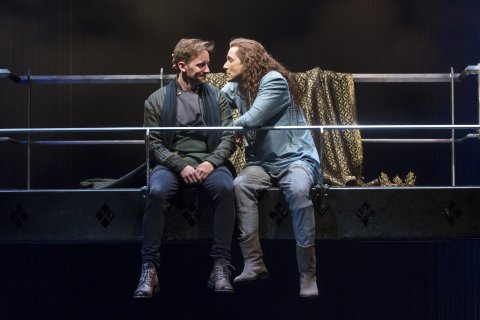
What about the decision to have the Duke of Aumerle murder Richard? In the play it's done by a random nobleman named Exton who appears out of nowhere.
To be fair, we're not the first production to ever do that. It sort of makes more sense, I think, than what's written. This is where having someone like Greg is enlightening, because now we know that there are precedents in Shakespeare where external influences had forced him to do rewrites. The reference to Exton doesn't scan, it's like it was put in late. Now, there's no evidence at all that this is what he intended, but I'm very happy to believe it is. The scene just before that is when Aumerle is caught by his father and then taken to Bolingbroke as a traitor. It just makes sense that that leads him to kill Richard. And then suddenly Exton shows up? It doesn't feel like very good writing to me!
We need to talk about Richard's hair.
[Laughs.] What about it?
It's a positively feral mane.
When we first did the play, I did it with hair extensions, which I lived with for months. So it's been something of a liberation to have it as a wig this time around.
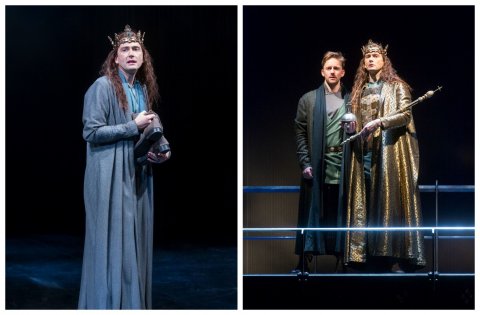
I'm going to let you explain the reasoning behind that particular bit of costuming.
Well I suppose it's unusual, but then that was the point. We wanted to find something that set him apart, something that he would've used to set himself apart. The idea is that nobody would've told him no, nobody would've said to him that this [unruly long hair] is not what you do. And also it fits into the whole seeing himself as a Christlike figure, which we play on shamelessly in the second half. It just made sense to me, that he would allow himself such a vain extravagance. He's an aesthete, you know? It's the same reason why I [as Richard] paint my nails with gold leaf.
You've mentioned before that Mark Rylance's performance with the RSC as Hamlet was a "life-changing" influence on you. It's interesting because you both have had an eerily similar career trajectory. You've also played Hamlet with RSC, and he's also been a very campy, very well-reviewed Richard II. Does that influence you anyhow?
He has! And I haven't seen him play Richard II! It's one of his performances that I never managed to catch, which is probably just as well because I'm sure I'd be intimidated beyond words. I saw Ben Whishaw's Richard, and that nearly finished my campaign. He was so good, so brilliantly cast and so effortless, I thought he was magnificent. There's a thrill to try and do these parts that all these extraordinary actors have done before you. It's almost like being at an Olympic event, but of course the downside of that is that you're inevitably comparing yourself to some extraordinarily fine actors, and sometimes that can be a little intimidating.
Did that sentiment affect you when you got cast in Doctor Who?
Any part that's been done by somebody else has that kind of sentiment, of you having to kind of—compete feels like the wrong word here, but I can't think of a better one. With Doctor Who, it's very different because it's an ongoing story so you're being handed something to look after. Whereas with a Shakespeare play, you're sort of being asked to find something new to say with words that have been used before. It's exciting and intimidating in equal measure.
You're also mounting this play at a very interesting time in American politics, where the power struggle has polarized the people very strongly. Do you think audiences will be tempted to draw parallels with how fraught the political scene is right now?
[Laughs.] Everyone I talk to asks me that same question! Oh absolutely, and I understand why they're asking! The whole world understands how important the contest of power that's going on in America is, and we're all looking for lessons from elsewhere. Of course Richard is not the template, but there are plenty of lessons to be drawn from Shakespeare's history plays. Lessons about hubris, lessons about humility, lessons about humanity. Shakespeare teaches how to be human in many ways, and in the history plays he teaches us most importantly about what to aspire for and demand from our leaders.
And lastly, do you now finally know what "Netflix and chill" means?
I had no idea! I just thought it was self-explanatory, just like kicking back and watching a box set.



